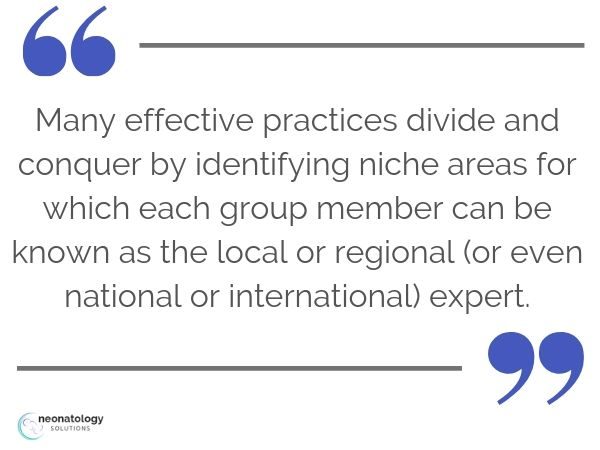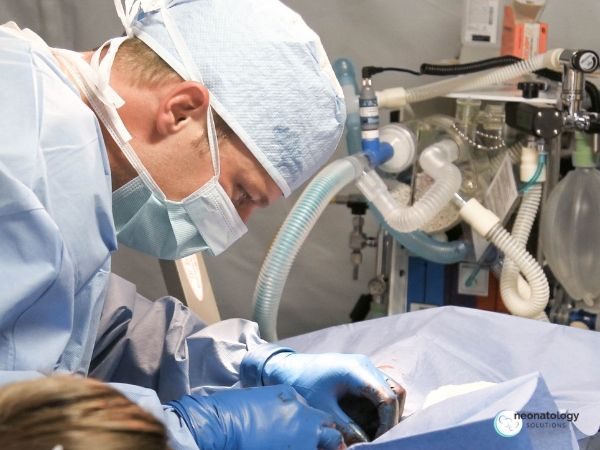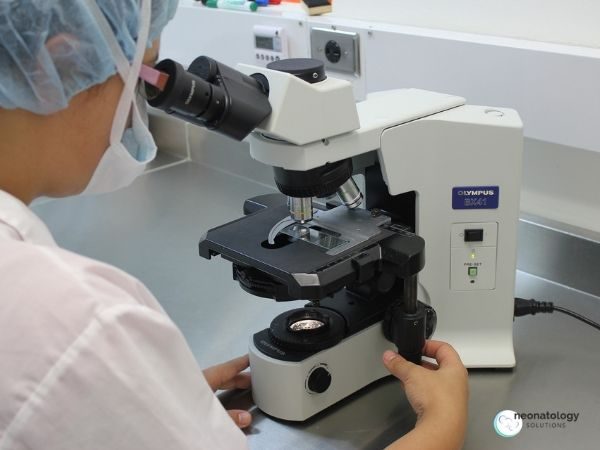Career Planning
|
Defining the Ideal Position
Develop Your Professional Niche
All well-trained neonatologists will have the requisite skillset upon completion of training to be clinically and procedurally competent, and will hopefully have the interpersonal skills to be effective communicators with families, staff, and peers.
As such, you need to actually bring more to the table because requisite clinical training won’t set you apart.

All well-trained neonatologists will have the requisite skillset upon completion of training to be clinically and procedurally competent, and will hopefully have the interpersonal skills to be effective communicators with families, staff, and peers.
As such, you need to actually bring more to the table because requisite clinical training won’t set you apart.

Having a skill or ability that you particularly excel at can not only help you stand out from the crowd but can also be a very gratifying focal point for your career.
With the rapid and seemly accelerating volume of medical knowledge, each provider can not be expected to be the best at everything. You should determine how your professional niche can offer a unique contribution to the group.
It could be something they actually need, are directly searching for, or have not recognized yet how it could bring value to their group. Another way to consider the importance of developing a niche is how it can increase your professional visibility, which could not be more important as you start to seek new employment.

Consider the following options as you look to develop (or highlight) your own professional niche, and review the questions to help you further refine your insight:
Clinical Proficiency
Training programs typically have faculty who have already identified their niche, and by training at these institutions, you have likely absorbed a substantial amount of this expertise.
Not only can you take this contemporary clinical knowledge to your new location, but you can use your connections to your previous attendings and mentors to stay in touch and stay up to date on behalf of your new practice.

Many times a clinical niche can provide you with opportunities to share your knowledge with other committees throughout the hospital.
For example, if you have particular interest or expertise in infectious disease you may wish to serve on the hospital Infection Prevention committee or as the CLABSI/CAUTI/VAP bundle coordinator.
- Are there certain cases or conditions you enjoy managing?
- Are there certain topics or conditions you spend extra time learning about?
- What have you become really good at managing?
- What cases or clinical conditions do you enjoy treating the most?
- Are there clinical areas you have had more than average exposure to than your peers?
- What were the areas of expertise of your mentors?
- Do you feel that you have gained additional insight into these areas?
- What type of advice or consultation do your colleagues ask you for?
- What are your strengths clinically?
- Does your training program have a niche that appeals to you?
- Does your program of interest have a niche that appeals to you?
Procedural Proficiency
You may have had many procedural opportunities in training, and let’s say that now you have become known for your ability to perform cutdown PICC lines in the hardest access cases. Or perhaps you can place a radial arterial line in a 400gm infant at 3 am without blinking an eye (or opening one).

Maybe you have a particular interest in high frequency ventilation or have taken the initiative to gain additional training to excel at point of care ultrasound.
You can use your niche to be the “one to call on” when these needs arise in your practice, or you could be the one to share your skills by educating others to your level of proficiency.
- Are there procedures you enjoy doing or for which you have become very proficient?
- Do your peers call you specifically for certain procedures or cases?
- Have you taken additional training courses for technology like aEEG or POCUS?
- Have you completed a specialized skill development or training course?
- Is there someone at your current training institution who can help you become an expert?
Research Prowess
All neonatology fellowship programs have a substantial research component, so graduates should all begin practice with a strong fund of knowledge regarding the fundamentals of completing and interpreting quality research.
If your career search leads you to stay in academics, you will clearly be carving out your research niche which oftentimes builds off of your fellowship project, or it may take a new track based on the mentors at your new academic center.

Even non-academicians, however, may have an interest in serving as the “research-expert” for a private practice or hospital-employed group. Clinical research does often occur at non-academic institutions, and quality improvement initiatives are active at nearly every institution and also require many of the fundamentals of research.
Your niche may be as the person who helps coordinate such projects, or perhaps you may be the practice partner who scours journals for high-quality articles that are relevant to your current initiatives, and then summarizes them for the benefit of the group.
- Did you enjoy your research endeavors in fellowship?
- Do you want to continue your line of investigation?
- Are you interested in bench or clinical research at a high-powered academic program?
- If you are looking at private practice, are you still considering clinical research projects?
- Do you enjoy staying current with the latest publications?
- Would you enjoy keeping sight of what is “on the horizon” for your partners?
- Is there anything to transfer to other aspects of patient care or practice?
Teaching
Some degree of teaching will be an expectation at all academic centers. Some have developed specific teaching tracks that focus even more heavily on the educational role. Sharing the knowledge and experience you have learned in your many years of training can be one of the most rewarding aspects of your career.

Keep in mind that non-academic programs also often provide teaching opportunities. Many private hospitals host clinical rotations for medical students, residents, and fellows. Neonatal nurse practitioner programs frequently have clinical rotations with private hospitals as well.
Bedside staff, whether they are nurses, respiratory therapists, nursing students, or assistants, all appreciate and benefit from both didactic sessions and just-in-time teaching at the bedside. An institution may provide educational outreach sessions for NRP or STABLE courses to RNs and MDs at outlying institutions.
If you enjoy teaching, you could consider adopting an educational position such as Outreach Coordinator or Residency Coordinator as your niche.
- Did you enjoy mentoring and teaching medical students and residents while in training?
- How about bedside staff? Parents?
- Do you have any prepared lectures or presentations from your training?
- Are you an NRP or STABLE instructor?
Other Practice Priorities
The options are endless when it comes to identifying your own niche and where and how you can develop a unique expertise.

Here are a few ideas of both clinical and non-clinical opportunities for you to consider for your niche.
- Transport
- Telemedicine
- Pharmacy and Therapeutics
- Feeding and Nutrition Committees
- EMR/IT Expert
- Vermont-Oxford or State Collaborative Coordinator
- QI Coordinator
- Did you participate and enjoy completing patient transports in training?
- How are your technology skills?
- Are there unit-based, practice-based, or hospital-based committees for which you have expertise or interest?
Additional Resources
Perspectives from a thoracic surgery fellow’s experience in how he focused on standing out from a crowded candidate pool when finding his first job.
Provides rationale, value, and steps to finding your professional niche from a hospitalist’s perspective.
Offers a unique perspective and guidance on finding your niche and suggests thinking about it as “finding your passion.”
A physician’s perspective on the “round about way” your professional niche may come to you or turn up unexpectedly.
Offers one ER doc’s perspective on how she found her niche from blending a “unique interest area with an unmet area of need.”


